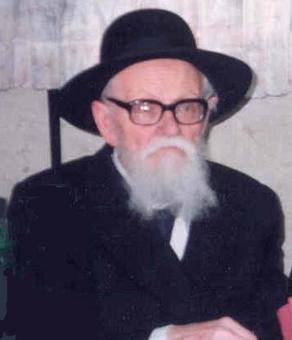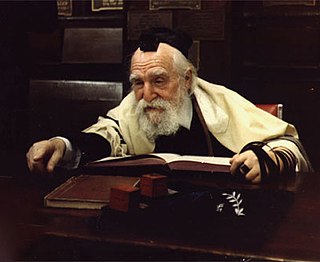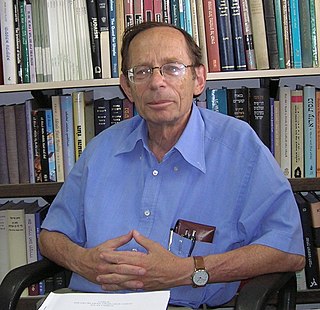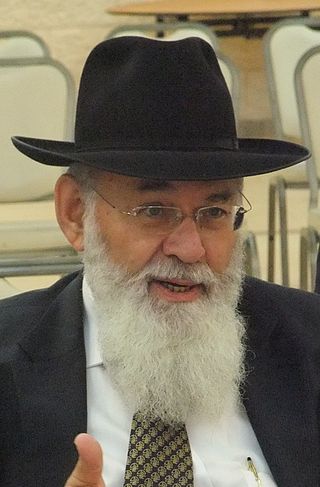
Menachem Elon (Hebrew: ) was an Israeli jurist and Professor of Law specializing in Mishpat Ivri, an Orthodox rabbi, and a prolific author on traditional Jewish law (Halakha). He was the head of the Jewish Law Institute of the Hebrew University of Jerusalem.

Mordechai Tzemach Eliyahu, was an Israeli rabbi, posek, and spiritual leader.

Eliezer Yehuda Waldenberg was a rabbi, posek, and dayan in Jerusalem. He is known as a leading authority on medicine and Jewish law and referred to as the Tzitz Eliezer after his 21-volume halachic treatise covering a wide breadth of halacha, including Jewish medical ethics, and daily ritual issues from Shabbat to kashrut.

Avraham Shapira was a prominent rabbi in the Religious Zionist world. Shapira had been the head of the Rabbinical court of Jerusalem, and both a member and the head of the Supreme Rabbinic Court. He served as the Ashkenazi Chief Rabbi of Israel from 1983 to 1993. Shapira was the rosh yeshiva of Mercaz haRav in Jerusalem, a position he held since Rabbi Zvi Yehuda Kook died in 1982.

Rabbi Chaim Hirschensohn was a prolific author, rabbi, thinker, and early proponent of Religious Zionism.
Shaare Zedek, also spelled Shaarei/Shaaray/Shaarey, Sedek/Tsedec/Tsedek/Tzedec/Tzedek, may refer to:
Aaron L. Mackler is Associate Professor of Theology at Duquesne University in Pittsburgh, Pennsylvania and an ordained Conservative Rabbi. He is an author in the fields of bioethics and Jewish law. He was editor of Life and Death Responsibilities in Jewish Biomedical Ethics and authored Introduction to Jewish and Catholic Bioethics, part of the Georgetown Press Moral Traditions series.

Moshe Feinstein was a Russia born American Orthodox Jewish rabbi, scholar, and posek. He has been called the most famous Orthodox Jewish legal authority of the twentieth century and his rulings are often referenced in contemporary rabbinic literature. Feinstein served as president of the Union of Orthodox Rabbis, Chairman of the Council of the Moetzes Gedolei HaTorah of the Agudath Israel of America, and head of Mesivtha Tifereth Jerusalem in New York.

Zalman Nechemia Goldberg was an Ashkenazi rabbi, posek, and rosh yeshiva (dean) in Israel. He was a son-in-law of Shlomo Zalman Auerbach.

Yehoshua Yeshaya Neuwirth was an eminent Orthodox Jewish rabbi and posek in Jerusalem. He was one of the primary students of Rabbi Shlomo Zalman Auerbach and the author of a two-volume Hebrew language treatise, Shemirat Shabbat Kehilchatah — translated into English as Shemirath Shabbath: A practical guide to the observance of Shabbath — a compendium of the laws of Shabbat which is viewed by many as an authoritative work regarding these laws.
Certain fundamental Jewish law questions arise in issues of organ donation. Donation of an organ from a living person to save another's life, where the donor's health will not appreciably suffer, is permitted and encouraged in Jewish law. Donation of an organ from a dead person is equally permitted for the same purpose: to save a life. This simple statement of the issue belies, however, the complexity of defining death in Jewish law. Thus, although there are side issues regarding mutilation of the body etc., the primary issue that prevents organ donation from the dead amongst Jews, in many cases, is the definition of death, simply because to take a life-sustaining organ from a person who was still alive would be murder.
Jewish medical ethics is a modern scholarly and clinical approach to medical ethics that draws upon Jewish thought and teachings. Pioneered by Rabbi Immanuel Jakobovits in the 1950s, Jewish medical ethics centers mainly around an applied ethics drawing upon traditional rabbinic law (halakhah). In addition, scholars have begun examining theoretical and methodological questions, while the field itself has been broadened to encompass bioethics and non-halakhic approaches.
David Applebaum was an American-born Israeli physician and rabbi. He was chief of the emergency room and trauma services of Jerusalem’s Shaare Zedek Medical Center. Applebaum was murdered in a Palestinian suicide bombing at Cafe Hillel in Jerusalem on September 9, 2003.
The Schlesinger Institute for Medical-Halachic Research was founded in Israel in 1966 under the funding of Shaare Zedek Medical Center. It is named after the hospital's second Director General. The institute is dedicated to the halachic approach to medical ethics, and has the purpose of researching and resolving the halachic issues that emerge as medicine progresses, to consider their medical, halachic, legal, and ethical ramifications, and to present practical responses. Leading rabbis, physicians. and others contribute to initiatives in line with the teachings of Torah.

Yitzchok Zilberstein is a prominent Orthodox rabbi, posek and expert in medical ethics. He is the av beis din of the Ramat Elchanan neighborhood of Bnei Brak, the Rosh Kollel of Kollel Bais David in Holon, and the Rav of Mayanei Hayeshua Medical Center in Bnei Brak. His opinion is frequently sought and quoted on all matters of halakha for the Israeli Lithuanian yeshiva community.
David Fink is an Israeli Orthodox rabbi and expert in halacha and Jewish medical ethics.

Gerald Blidstein was professor emeritus of Jewish philosophy at Israel's Ben-Gurion University of the Negev. He was the Israel Prize laureate in Jewish philosophy (2006) and had been a member of the Israel Academy of Sciences since 2007.

Avraham Steinberg is an Israeli medical ethicist, pediatric neurologist, rabbi and editor of Talmudic literature.
Laurie Zoloth is an American ethicist, currently Margaret E. Burton Professor at the University of Chicago Divinity School. She was the first Jewish dean of the Divinity School, and also the School's shortest-serving dean, having been in the position from 2017 to 2018, whereupon she was replaced by an interim dean and stepped into an advisory administrative position.

Analia Bortz is a medical doctor with postdoctoral studies in bioethics. She became the first female Latin American rabbi when ordained in Jerusalem at the Seminario Rabinico Latinoamericano in 1994. In 2003, she and her husband, Rabbi Mario Karpuj, founded Congregation Or Hadash in Sandy Springs, Georgia. In 2018 Rabbi Dr. Analia Bortz was chosen as 1 of the most influential women in the world by the BBC. In 2023 Rabbi Dr. Bortz became the Founding co-director at the Center for Ethics at the Vatican and the University Abarvanel- Seminario Rabinico LatinoAmericano. In February 2024 Rabbi Dr. Analia Bortz launched the first Center for Ethics at the Vatican, in collaboration with Pope Francis, and Monseñor Vicenzo Paglia.











